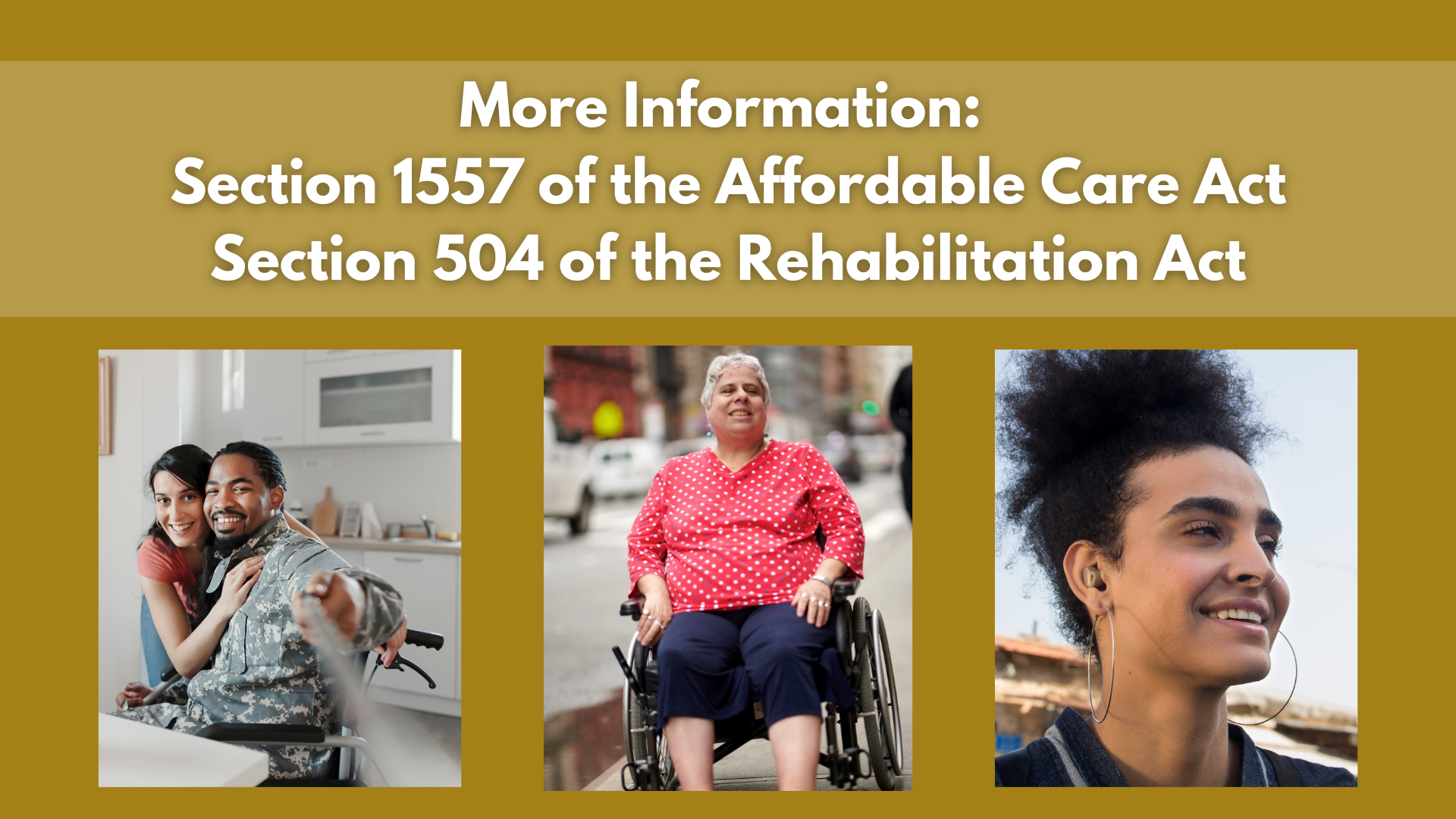Check out our blog series that documents the 2024 finalized rules for Section 1557 of the Affordable Care Act! Last week, we touched on what this new rule states and how it affects people with disabilities (PWDs). This week, we cover discriminatory benefit designs.
This weekly newsletter will be transitioning to a biweekly basis starting next week! We will pick back up on Friday, June 7.
The Administration for Community Living (ACL) worked with the Office for Civil Rights (OCR) to help implement the 2024 final rule for Section 504 of the Rehabilitation Act to strengthen the prohibition of discriminated on disability in health care. OCR will be hosting a webinar on this final rule on May 28; register here.
The Kaiser Family Foundation (KFF) provided a comprehensive background on Section 1557. This extensive issue brief covers its inception, key dates, impact summaries, major changes, and future implications.
Georgetown University’s Center for Children and Families (CCF) reviewed the access provision in the final Medicaid managed care rule. Provisions include searchable provider directories, annual payment analysis’, wait time standards, and secret shopper surveys with compliance dates starting as early as July 2025 and as late as 2029.
The ACL posted a “Save the Date” for a hybrid event that will commemorate the 25th anniversary of the Olmstead Act on June 20 from 2:00 to 4:00 PM ET. This act ruled that the unjustified segregation of PWDs was a form of unlawful discrimination under the Americans with Disabilities Act.
CCF reported on the Center for Medicare and Medicaid Services’ (CMS) final regulation in Ensuring Access to Medicaid Services, known as the “Access Rule.” Best practices would include state-based experts and advocates to help Medicaid Enrollees, like PWDs, to be able to provide feedback to this process.
CCF also covered a draft senate finance bill committee bill that would address current drug shortages that includes a broad decrease of Medicaid inflation-related rebates for generic drugs. Concerns include that this change would increase the cost for generic drugs in Medicaid programs and not address shortages of in demand generic drugs.
KFF included an analysis in their policy watch on where the ACA Marketplace enrollment is quickly increasing. Five states with the fastest growing enrollment rates since 2020 were Texas, Mississippi, Georgia, Tennessee, and South Carolina; all these states started with high uninsured rates, did not have expanded Medicaid, and use HealthCare.Gov as their enrollment website.
CCF reviewed which states made the most progress in the Medicaid unwinding in 2023/ This table includes each state’s baseline comparison for each month, baseline enrollment in Medicaid/ Children’s Health Insurance Program (CHIP), renewal report months, total renewals due, and the percent that was completed.
As of May 10, states have reported renewal outcomes for more than half of those enrolled in Medicaid/CHIP, according to data from the Kaiser Family Foundation (KFF) with 24 million renewals still remaining. 23% of those who completed the renewal process were disenrolled and 48.1 million enrollees were able to qualify for renewed coverage. The large range of disenrollment rates in each state varies, with the highest of 56% being in Utah and the lowest of 13% in Maine and North Carolina. Out of all states with available data, 69% of all those disenrolled were due to procedural reasons.
CCF has been covering the Medicaid and CHIP monthly application volume with a “Medicaid Application Tracker.” This is a great tool to analyze application data from CMS for those seeking healthcare coverage.
CCF reviewed application timelines to ensure timely processing for extensions of unwinding flexibilities. This will help address the 13 million individuals that lost coverage due to procedural or paperwork reasons with nearly half of them remaining eligible for coverage.
CCF analyzed data from the U.S. Census Bureau that showed that children ages 0 to 4 years old were underrepresented in the 2020 census; this could mean that even more children that are attributing to the uninsured rate and developing coverage trends.
The Department of Health and Human Services (HHS) announced the Maternal Mental Health Task Force’s national strategy to help improve maternal mental health through five pillars of targeted milestones.
May 12 to 18 is National Women’s Health Week! 2024’s theme is “Empowering Women, Cultivating Health: Celebrating Voices, Wellness and Resilience.” Today’s theme is “Reproductive Health from Puberty to Menopause and Beyond.”
Make sure to nominate yourself or a deserving colleague for one of the annual American Public Health Association’s Disability Section Awards. The deadline for nominations is Friday, May 31 at 11:59 PM PT.
Archives of our weekly updates are available on the NDNRC website. Follow us on Twitter/X at @NDNRC!
The NDNRC Newsletter will be released on a biweekly basis starting on May 24 and will continue on said schedule until September 6, 2024.

